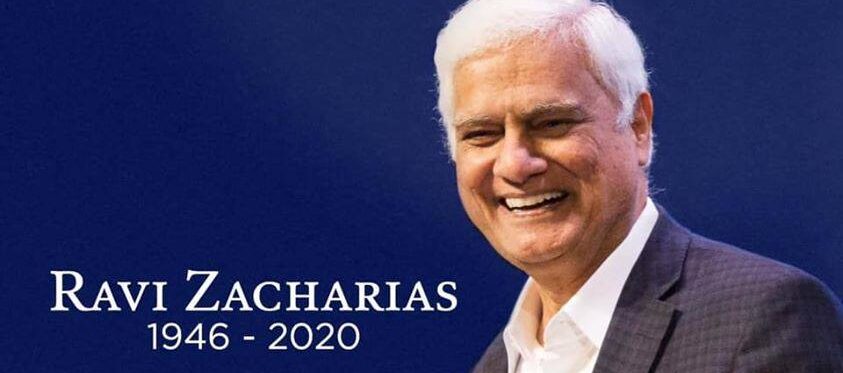This morning I opened up my computer to read the news that Ravi Zacharias had passed away. For those of you who are unfamiliar with Dr. Zacharia’s work, he was a very well known apologist who spoke at college campuses and throughout the world regarding the Christian faith.
Often, Dr. Zacharias would take questions from the crowd as part of his lectures. My fondest memory of his lectures comes from this time. A young man approached the microphone with a question regarding original sin and the depravity of man. He asked, “Why do Christians believe that people are evil and incapable of doing good? I feel like I am a good person and I think most people are good. Why doesn’t Christianity focus on helping people be better instead of telling them they need saving?”
Ravi Zacharias grinned and slowly approached the microphone. “Let me ask you a question,” he responded, “Do you lock your doors at night?”
A roll of laughter went over the crowd and his point was made. The young man at the microphone said that he believed people were good, but his actions contradicted his words. Dr. Zacharias went on to explain his theological standpoint and how it could be seen in humanity.
Dr. Zacharias’ life is a powerful reminder that the church needs to know what she believes and be able to defend those beliefs. Here are a few things that I have learned from Zacharias’ ministry that I hope you will take away from it as well.
1. Defending your faith means knowing what you believe.
If there is one undeniable truth about Zacharias, it was that he knew his stuff. If we go back 70 years it was easy to go through life as a Christian without being challenged. Today Christians have their beliefs challenged daily. We are challenged by our peers, challenged by our leaders, and challenged by our culture. If we do not have a strong grasp of what we believe and WHY, then we are going to be set up for some major challenges.
Unfortunately, there is no shortcut to knowing your stuff. Yes, the Holy Spirit works in and through us to make the Gospel known (Mark 13:11) However, this is no excuse to be ignorant of our faith. We need to read, even study, our Bible. We need training and discipleship in order to stand firm when we are challenged. Paul said it this way to Timothy, “Until I come, give attention to the public reading of Scripture, to exhortation and teaching. Do not neglect the spiritual gift within you, which was bestowed on you through prophetic utterance with the laying on of hands by the presbytery. Take pains with these things; be absorbed in them, so that your progress will be evident to all.”
Notice that Paul commanded Timothy to trust in the Spirit, but do the work also!
2. Defending your faith means knowing what they believe.
Dr. Zacharias also was very diligent to understand the viewpoint of the opposition. Zacharias was well known for his ability to field any question that the crowd would throw at him. This meant that he had to know the viewpoints of his opposition and speak knowledgeably of them. He sought to not merely create a “straw-man” argument but to honestly engage with their ideas & show why Christianity was superior with a more consistent worldview.
Every Christian should be able to do the same or at least be willing to learn. This means we need to listen to others; their concerns and their beliefs. It also means that we cannot put ourselves in a safe little Christian bubble where our beliefs are never challenged. Many have done so and future generations suffer when we stick our heads in the sand. Instead, engage with opposing viewpoints. Take the time to learn their beliefs, and ask questions to make sure there is understanding. Be willing to postpone the conversation while you go to Scripture and other resources to make a case.
We will discover that many people want to have an honest conversation. Peter said, “But sanctify Christ as Lord in your hearts, always being ready to make a defense to everyone who asks you to give an account for the hope that is in you…” (1 Peter 3:15a)
3. Defending your faith means doing so with love
Peter 3:15 finishes with these words, “yet with gentleness and reverence.” Peter wanted the Church to understand that the goal of “making a defense” was to win the person to Christ; not just win the argument.
Dr. Zacharias understood this as well. His gentle voice and even temper did much to show people the love of Christ. He did not lose his temper. He did not insult his opponents. He did not attack people on a personal level. Instead, he loved people and he wanted to see them leave every conversation closer to Christ than when they began.
As we carry on, we should also seek to love first. Let us graciously engage the culture with love and a strong argument. It should be our goal to win souls; not arguments. If we keep this in the front of our minds, then there is nothing we cannot do for the Kingdom of God.
Thank you, Ravi Zacharias. You have had an impact on my life and many more. I rejoice in knowing that you are rejoicing at the throne of the Father as we speak.
Until that day…

